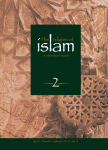The Religion Of Islam vol.2

- 1-Preface
- 2-I- PRAYERS TO GOD
Prayer – A Principle of Action
Time of the Five Stated Prayers
Aim of the Prayers
Muslim Prayer – A Spiritual Diet
Description Of The Muslim Prayers - 3-Ablution
Purification - 4-How the Prayer Service is Performed
- 5-The Stated Daily Prayers
- 6-The Friday Prayer Service
The Qunut
Special Service - 7-II- ZAKAT OR LEGAL ALMS
Types of Zakat - 8-III- FASTING
- 9-IV- PILGRIMAGE
Pilgrimage As A Fundamental Institution - 10-PART II- TRANSACTIONS
V- MARRIAGE
Marriage – A Civil Contract
Kinds Of Divorce
Different Forms of Divorce
Prohibited Marriages
Suggested Reconciliation
Prohibited Marriage Relations In Islam
Religious Ceremony On The Occasion Of Marriage - 11-Inequality Of The Two Sexes Regarding Divorce
Limitation of Divorce Islamic - 12-Islamic Legal Status of a Married Woman
- 13-VI- NHERITANCE
Law of inheritance
Gifts And Donations
Points of Contact
A – Legal Heirs And Sharers
B – Residuaries
C – Distant Kindred - 14-VII- SALE AND USURY
Usury
Lawful Transactions
Koran Enjoinments Relating to Trade and Usury - 15-VIII- OWNERSHIP
Kinds And Divisions Of Property Ownership
Divisions of Waqfs - 16-PART III- PENAL LAWS
IX- CRIMINAL INTENTIONAL INJURY
Crime Of Murder - 17-X- ADULTERY
Punishment For Slander - 18-XI- THEFT AND ROBBERY
- 19-Chapter XII - Divisions Of Punishment
- 20-XIII- DISCRETIONARY CORRECTION OR TA’ZIR
- 21-XIV- SINFUL ACTS
Classification
Permissible And Prohibited Food - 22-PART IV- MORALITIES
XV- MUSLIM ETHICAL BASIS OF SOCIAL LIFE
Position Of Women In Islam - 23-XVI- MUSLIM ETHICS AND MORALITIES
Directions Relating to Reformation of Man’s External Life - 24-XVII -THE MORAL CONDITIONS
Chastity
Honesty
Peacefulness
Politeness
Forgiveness
Goodness
Courage
Veracity
Patience
Sympathy - 25-XVIII- TRUE BELIEVERS
Their Manners And Characters As Described In The Koran - 26-PART V- MUSLIM JURISPRUDENCE AND THEOLOGY
XIX- KORAN AND JURISPRUDENCE - 27-XX- KORAN - FIRST SOURCE OF JURISPRUDENCE
Divisions Of The Koran
Orientalists Reviewing The Koran - 28-XXI- THE TRADITIONS- SECOND SOURCE OF JURISPRUDENCE
- 29-XXII- TRANSMISSION OF HADÎTH IN PROPHET’S LIFETIME
Why Hadîth Was Not Generally Written - 30-XVIII- THE EARLIEST PRESERVATION OF TRADITIONS
Collection of Hadith (First Stage)
Collection of Hadith (Second Stage)
Collection of Hadith (Third Stage)
Collection of Hadith (Fourth Stage)
Collection of Hadith (Fifth Stage) - 31-XXIV- THE KORAN IS THE GREATEST TEST FOR JUDGING HADÎTH
- 32-XXV- THE STYLE OF COMPOSITION EMPLOYED IN THE IMPARTING OF TRADITIONS
- 33-XXVI- DEGREES OF AUTHENTICITY OF THE NARRATORS
- 34-XXVII- RULES FOR DISTINGUISHING FALSE TRADITIONS
- 35-XXVIII- IJMA’ - THE THIRD FOUNDATION OF ISLAMIC LAWS
Establishment of Ijtihad
The Four Great Divine Doctors
Different Methods Forming New Laws - 36-XXIX- DEGREES OF IJTIHAD
‘Qiyas’ or Analogy
Istihsan or Equity
Istislah or Public Good
Istidlal or Inference
Ways of Inferring “Ijma” - 37-PART VI- JIHAD
XXX- THE RELIGIOUS DEFENSIVE WARFARE
Koranic Verses on Jihad
Observance of Jihad - 38-XXXI- MISCONCEPTION OF THE DUTY OF JIHAD
Islam Was Not Spread By Force
Fearful Wars of The Christian Clovis - 39-XXXII- PAYMENT OF TRIBUTE CALLED "JIZIA"
Islam, Jizia or The Sword
Directions Relating to War
Treatment of The Prisoners of War
Prisoners of War Not Slaves
War as a Struggle to Be Carried on Honestly - 40-PART VII- SPIRITUAL ASPECT OF ISLAM
XXXIII- THE TREASURES OF HAPPINESS - 41-References

